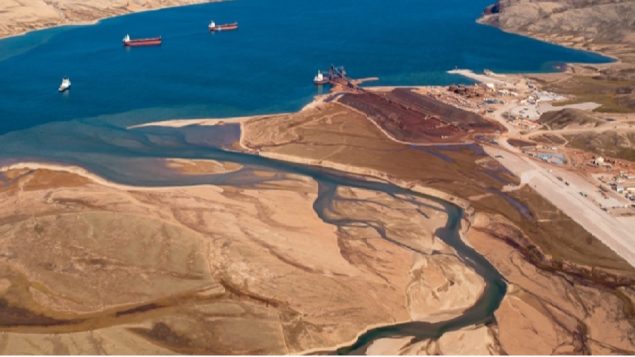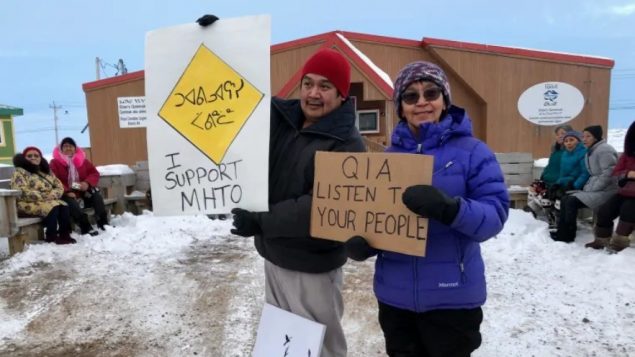Protests by Indigenous activists in Canada’s Arctic territory of Nunavut against plans to expand production at the Mary River Mine have disrupted operations at one of the world’s richest and northernmost iron ore deposits, according to the company operating the mine.
Baffinland Iron Mines Corporation said Monday ongoing protests at the mining operation in the High Arctic have stranded about 700 hundred workers at the campsite.
“The Mary River airstrip is currently closed to all regularly scheduled air traffic,” the company said in a press release. “Food and supply flights have been suspended, as well as employee and contractor transfers, search and rescue flights, and other North Baffin air traffic support services provided by the Mary River airstrip.”
Community members across Nunavut came out in peaceful protests on Monday, to show solidarity with a group of Inuit hunters who continue to blockade the mine on North Baffin Island.

Baffinland’s Milne Bay Port loading site. (Baffinland)
Baffinland wants to double its annual mining output to 12 million tonnes. To do this, it proposes to build a railway and increase shipping through its port at Milne Inlet to carry iron ore to smelters around the world.
Protesters worry that the planned railway will scare off the already scarce caribou and increased shipping traffic will force key marine species to move to other areas of Baffin Bay to escape the deafening underwater noise produced by the large bulk carriers.
The waters surrounding the port are a crucial habitat for narwhal in the Canadian Arctic.
Protesters at the blockade from Pond Inlet, Igloolik and Arctic Bay told CBC News Inuit harvesting rights are being ignored in the company’s bid to expand the mine.
Mekai Popoff, who is originally from Pond Inlet, one of the closest communities to the mine, said Nunavut’s founders fought hard for Inuit to have a say over their lands.
“I do support economic development. Just remember what our former leaders have given up just so that we can have Nunavut, we can’t just give that up,” Popoff told CBC News.
The protesters are also blaming the Qikiqtani Inuit Association (QIA), the group that represents Baffin Island Inuit, for being blinded by the prospect of tens of millions of dollars the organization will get if the deal gets approved.
The association renegotiated a new Inuit Impact Benefits Agreement with Baffinland in 2018. The agreement calls for the company to invest $10 million towards a training centre in Pond Inlet, $2.25 million a year toward Inuit training, and $400,000 a year to provide hunters with gas and an agreement to buy a boat for hunters every three years.
QIA itself is expected to receive a $45-million bonus if the mine expansion project is approved.
With files from Beth Brown CBC News







For reasons beyond our control, and for an undetermined period of time, our comment section is now closed. However, our social networks remain open to your contributions.